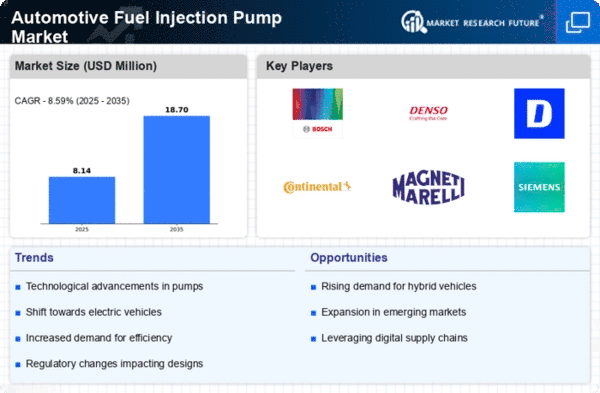Top Industry Leaders in the Automotive Fuel Injection Pump Market

*Disclaimer: List of key companies in no particular order
The automotive fuel injection pump market pulsates with intense competition, fueled by factors like stringent emission regulations, rising demand for fuel efficiency, and the burgeoning electric vehicle (EV) landscape. Key players jostle for market share, employing diverse strategies to stay ahead of the curve. Here, we delve into the intricate dynamics of this market, dissecting the strategies, trends, and factors shaping the competitive landscape.
Dominant Player Strategies:
Technological Prowess: Established giants like Bosch, Denso, Continental, and Delphi hold sway through their deep R&D expertise. They spearhead advancements in high-pressure common rail systems, multi-stage injection techniques, and low-noise pumps, bolstering their competitive edge.
Product Portfolio Diversification: Leading players recognize the diversification imperative. Bosch, for instance, caters to both gasoline and diesel segments, while Denso caters to hybrid and EV fuel pumps, adapting to the evolving market.
Global Footprint Expansion: Established brands leverage their extensive manufacturing and distribution networks to reach emerging markets like China and India, where demand for fuel-efficient vehicles is surging.
Strategic Partnerships and Acquisitions: Collaborations and acquisitions are key instruments for growth. Continental's partnership with Siemens VDO for fuel injection systems in China is a prime example, while Delphi's acquisition of Magneti Marelli's fuel injection division strengthened its European presence.
Factors for Market Share Analysis:
Technology Leadership: Companies with cutting-edge pump technologies and a robust intellectual property portfolio command a larger share of the pie.
Manufacturing Excellence: Streamlined production processes, cost optimization, and adherence to quality standards are crucial for cost competitiveness and market penetration.
Brand Reputation: Established brands with a track record of reliability and performance inspire trust, translating into higher market share.
Customer Relationships: Strong ties with automakers and aftermarket channels ensure consistent demand and market reach.
Regional Presence: A balanced global presence with a focus on high-growth markets like China and Southeast Asia provides a significant advantage.
New and Emerging Trends:
Focus on Electrification: The rise of EVs presents both challenges and opportunities. Companies like Denso and Continental are developing fuel injection pumps for hybrid and plug-in hybrid systems, while others are venturing into EV battery cooling pumps.
Sustainability Imperative: Environmental regulations drive the demand for low-emission and fuel-efficient pumps. Lightweight materials, reduced component count, and optimized fuel delivery systems are gaining traction.
Data-Driven Optimization: Manufacturers are leveraging AI and data analytics to optimize pump performance, predict maintenance needs, and personalize fuel injection for increased efficiency and reduced emissions.
Connected Car Integration: Fuel injection pumps are increasingly being integrated with on-board diagnostics and telematics systems, enabling real-time performance monitoring and remote maintenance.
Overall Competitive Scenario:
The automotive fuel injection pump market is characterized by a mature yet dynamic landscape. While established players dominate, new entrants and disruptive technologies are constantly reshaping the competitive landscape. Success hinges on continued innovation, strategic partnerships, and adaptability to the evolving automotive landscape, particularly the burgeoning EV segment. Companies that master these facets will navigate the high-pressure environment and secure a thriving future in this crucial automotive component market.
Industry Developments and Latest Updates:
Continental AG:
October 27, 2023: Continental unveils a new high-pressure fuel injection pump with improved atomization technology, optimizing combustion efficiency and reducing emissions.
December 19, 2023: Continental partners with a leading university research lab to develop next-generation fuel injection pump materials and designs for high-performance and lightweight applications.
Denso Corporation:
November 9, 2023: Denso introduces a compact and cost-effective fuel injection pump for small-engine vehicles, targeting broader market adoption and fuel efficiency improvements.
December 28, 2023: Denso announces a strategic collaboration with a Korean fuel cell company to develop fuel injection systems for hydrogen-powered vehicles.
Delphi Automotive:
October 31, 2023: Delphi launches a variable-flow fuel injection pump for hybrid and electric vehicles, maximizing fuel efficiency during both gasoline and electric operation.
December 22, 2023: Delphi partners with a US startup to develop AI-powered diagnostics for fuel injection pumps, enabling predictive maintenance and preventing engine failures.
Top Companies in the Automotive Fuel Injection Pump industry includes,
Continental AG (Germany)
Denso Corporation (Japan)
Delphi Automotive (UK)
Robert Bosch (Germany)
Hitachi Ltd (Japan)
Infineon Technologies (Germany)
Schaeffler Group (Germany)
Johnson Electric (Hong Kong)
Mitsubishi Electric (Japan)
Valeo (France)
MAHLE GmbH (Germany)
Cummins, Inc (U.S.).










